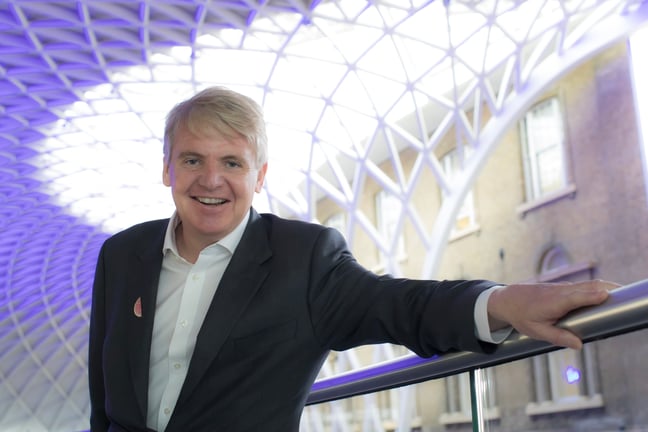
Forward editor Caitlin Mackesy Davies learns how we might all be able to live long and prosper from one of the world’s foremost investors in innovation
Forward: features are independent pieces written for Mewburn Ellis discussing and celebrating the best of innovation and exploration from the scientific and entrepreneurial worlds.
Billionaire investor and author Jim Mellon describes his involvement in the longevity technology sector as a matter of ‘happenstance’.
As he tells me on a Monday morning Zoom call, one of his long-time partners – with whom he has set up a number of biotech companies over the past 15 years – has always been interested the question of extending the human lifespan. It was this connection that led Mellon to ‘become aware that the science of longevity was catching up with the aspiration of all of us to live healthier and possibly longer lives’.
‘Partly out of sheer interest,’ Mellon decided to follow up this subject and write a book about it. The result, entitled Juvenescence: Investing in the Age of Longevity, is based on more than three years of conversations with opinion makers and experts on the subject of human longevity and ageing. It describes the type of treatments we might see on pharmacy shelves in years to come and picks out key technologies that will play a part in allowing us to live in a ‘wellderly state’. These include genetic engineering, stem cell therapy and immunotherapy, and there is also a nod towards the role of artificial intelligence in creating novel compounds.

Jim Mellon describes his involvement in the longevity technology sector as a matter of ‘happenstance’
The book also provided a ready-made name for the new company that Mellon and two partners set up in the run-up to its publication. Since 2016, some $200m has been raised to fund Juvenescence, which now employs around 30 people and has about 20 projects across 12 companies, says Mellon. ‘It’s no secret that we’ll be taking the company public later this year,’ he adds. This will ‘hopefully raise significant amounts of money that will advance our mission’.
According to the company website, that mission involves ‘transform[ing] what aging means to the world… We’re not just reimagining what it means to get older – we’re committed to helping you reimagine your lifetime.’
It’s no small goal, but Mellon stresses that the focus for Juvenescence is firmly on bringing viable products to market – not bankrolling blue-sky ideas. ‘We're not interested in science projects,’ he says. ‘If you’ve got something that’s ready to go into the clinic or close to going into the clinic we’d be interested, but it has to address a significant unmet medical need. And you have got to have either amazing science or a clear business plan – preferably both.’ Of course, he adds, the intellectual property must be defensible: ‘Robust IP that has got a long duration and novel science, not just a slightly better iteration of something that already exists.’
Importantly, Mellon concludes: ‘We’re FDA all the way, in the sense that everything that we do is going to be about clinical trials through the normal regulatory processes. We’re not believers in self-injecting with stem cells or trying to lengthen your telomeres. We are not in that category.’
Beyond the BS
That’s not to say there isn’t room for imagination and grand vision – which seems right for a business co-founded by someone known for predicting the next great ‘money fountain’ for the world’s investors.
How does he get the balance right? First of all, it’s important to remember that this venture is, as Mellon puts it, ‘a continuation’ of a long-term involvement in biotech rather than a sudden realisation that longevity is the ‘great new thing we need to focus on’. He and his partners will be falling back on their experience in a number of ventures, many of which have gone public in the US.
Mellon believes the trick is ‘seeing through the BS and recognising when something is more likely to fail than to succeed – then cutting it early so that we don’t pour more money down a large drain. That’s a big trick, by the way, in biotech. Nonetheless, it’s about being enthusiastic and open to stuff that may have initially sounded a bit science fiction-y, but that could have a major patient impact.’
As an example of something with the right mix, he points to a current phase-two trial backed by Juvenescence that is regrowing liver tissue. He admits that it ‘sounds a bit weird’ but explains that ‘we use lymph nodes adjacent to the failing liver, seed them with hepatocytes and then hopefully within a year you’ve got a brand-new, effectively functioning liver that takes over from the failing one.
‘Most people would probably, on first hearing about that, dismiss it. But it actually works, and it’s got tremendous platform opportunity to regrow other failing organs, including the pancreas or the thymus, which is where T cells [which play a vital role in the immune response] are produced. So it takes a bit of a leap of imagination to do that sort of thing, but the rewards for patients and for investors are just phenomenal.’
To realise these rewards, investment follows a trusted formula at Juvenescence. ‘We buy controlling stakes in companies, because we want to be actively involved with them. We don’t just want to be a passive investor,’ Mellon explains. ‘We then work with the companies to cross-fertilise them.’

Taking a shot
‘We’ve got plenty of shots on goal,’ continues Mellon, who acknowledges that it’s still early days for longevity tech. The sector’s growth hasn’t been helped by some ‘mixed messages’ and a few notable flops. ‘We’re in the phase of the industry where we know that some things are going to work, but we don’t know exactly what. And there have been two, maybe three, clinical trials from the longevity industry that have either been designed poorly or that failed because the science wasn’t there.’
Nonetheless, he says: ‘We know that the pathways of ageing that have been discovered in the past 20 years are, in many cases, malleable even in mammalian species. We know that those alterations can get more sophisticated, and we know that some drugs are golden.’
By way of example, he cites metformin – typically used to treat type 2 diabetes – which he says is likely to have a longevity side to it. As might rapamycin, which has been used to counter transplant organ rejection since the ’70s. He also thinks that senolytics – compounds that remove senescent cells – hold great promise in the small molecule area.
Despite all of these bright spots, Mellon admits that researchers are still ‘groping a little bit in the dark’. ‘There’s a very, very dim flashlight showing the way,’ he says. ‘We realise that there is going to be a high degree of failure.’
As a result, Juvenescence is hedging its bets. One manifestation of this is a consumer side that’s about to launch its first product, Metabolic Switch, produced in partnership with the Buck Institute for Research on Aging. The chocolate-flavoured drink is intended to stimulate the production of ketones – specifically beta-hydroxybutyrate and acetoacetate – which may have a role in increasing longevity.
Over the next few years, gene therapy ‘will be a laser focus of Juvenescence’, Mellon says, picking up on the potential of CRISPR-Cas9 to ‘revolutionise’ the science of longevity.
And when I voice a fear of Alzheimer’s, Mellon offers a soothing forecast, explaining that Juvenescence is working on a prophylactic drug that promises to stop the build-up of amyloid plaque or tau protein tangles, the disease’s primary drivers. If this drug reaches the market, Mellon predicts that: ‘Even if you’re familially disposed to Alzheimer’s or you’ve got the gene variant that would suggest you’re more likely to get dementia, you take a pill and it will stop that from happening in the same way that you take a statin to stop the buildup of cholesterol, or an ACE [angiotensin-converting enzyme] inhibitor to lower your blood pressure. It would be a kind of daily routine.’
On the question of how quickly the sector will reach critical mass, Mellon describes himself as a ‘gradualist’. He doesn’t expect a pay-off overnight.
‘All through human history, everyone has been looking for the elixir of youth and nothing has ever worked. So people are highly sceptical. It’s much better to say we’ll have a gradual path and we’re making progress. You can expect to live more robustly and positively, you can expect to live longer. And hopefully we and others will succeed in doing some of it at least.’
That’s not to say that once a game-changing discovery comes to light, it can’t create great momentum. As an example, Mellon says: ‘I wrote my first book on biotech in 2012. At that point you didn’t have CRISPR-Cas9, you didn’t have artificial intelligence for the development of novel compounds, but perhaps most importantly, you didn’t have cancer immunotherapy.
‘This year it will be the biggest selling drug category on the planet, worth $260bn dollars. Yet it didn’t exist eight years ago. And I think it will be like that with longevity too. This will be a massive market. We just don’t know precisely what those pills and therapies will be yet.’
What’s the point?
Of course, there are still some big question marks around the idea of longevity.
Asked what the purpose of a longer life is, Mellon takes a moment to gather his thoughts before replying: ‘That’s a very good question – if you’re going to live in a very miserable condition in the latter parts of your life.’
‘Typically,’ he continues, ‘16% of people’s lives at the end are characterised by one or more morbidities, a dread disease of some sort. The objective of Juvenescence is to compress that period of morbidity and then ultimately add a few extra years of life.
‘We know now that biological change is possible and that we’re not programmed to die, but wear and tear gradually ruins our mechanisms of repair. If that wear and tear can be repaired more effectively, then we’ll probably live longer.’
So just how long might we expect to live well, and what would that mean for our society? ‘It’s my contention,’ replies Mellon, ‘that the average life expectancy in the developed world will be somewhere around 110 within 30 years. And that changes everything.
‘The bottom line is that the old way that we’d look at life – you’re born, you learn, you earn, you retire and you expire – is probably going out of the window. People will be working in some way or another all the way through their lives, and learning all the way through their lives. People will have to be highly adaptable.’
“It’s my contention that the average life expectancy in the developed world will be somewhere around 110 within 30 years. And that changes everything.”
Then there’s the vexed subject of means, this time economic. Mellon admits that ‘to begin with, some of these drugs and therapies will be expensive and probably only available to people in rich countries’. But he believes that period will be ‘a blink of the eye in the context of most people’s lives’.
‘A new drug typically has an exploitable patent life of around 10 years, which in the context of a 100-year life isn’t very long. I think it will be widely available to everyone in due course, which is what we want.’
Which begs the question of why he wants it. It’s not simply because he sees a route to a tidy profit, it seems. It’s also because longevity (in its role of improving human health) is, in Mellon’s opinion, one of the three great challenges and opportunities for mankind, along with – and linked to – food supply issues and climate change. He calls these the ‘Holy Trinity’ for investment in the next 50 years.
It’s no coincidence that his ‘other passion’ is trying to change agriculture, in particular by ending our reliance on intensive animal farming for meat – the same animals that account for an estimated 20% of global greenhouse gas emissions. It also fits in with his entrenched antagonism towards animal cruelty, which he believes is part and parcel of modern industrial farming.
In his latest book, Moo’s Law: An Investor’s Guide to the New Agrarian Revolution, released in December 2020, Mellon sets out the case for a radical transformation in food and farming based on alternative proteins, including cultured meat. In its emotive introduction, he states emphatically that: ‘Farming MUST change, attitudes to food HAVE to change, we MUST change… And we have the means to do it.’
And as we end our own encounter, he’s equally unequivocal about how we tackle these critical issues. ‘It’s clear that things need to happen fast, and the means to make them happen fast is there now. There’s no excuse.’
I get the sense that the gradualist in him had better get ready for a fight.
The tech that will take us to living well
Adam Gregory, Partner and Patent Attorney at Mewburn Ellis comments:
"When people first hear about ‘longevity technology’ they often jump to sci-fi notions of living forever. A closer and much more exciting horizon is its potential to dramatically reduce age-related morbidity and what that could mean for us all as individuals, as well as for the global economy. As the field matures and our understanding of the relationship between aging and disease develops, I expect we will soon see approval of the first therapeutic/prophylactic interventions aimed at ensuring we spend that much more of our lives not just living – but living well."
Featured illustration by Andrea Manzati
Written by Caitlin Mackesy Davies
Adam is a Partner and Patent Attorney at Mewburn Ellis. He works with biotech companies to build and manage their patent portfolios, drafting patent applications and co-ordinating prosecution worldwide. Adam has particular experience handling portfolios relating to therapeutics (particularly immunotherapies, including adoptive cellular therapies), antibody technology, diagnostics, and regenerative medicine.
Email: adam.gregory@mewburn.com
Sign up to our newsletter: Forward - news, insights and features
Our people
Our IP specialists work at all stage of the IP life cycle and provide strategic advice about patent, trade mark and registered designs, as well as any IP-related disputes and legal and commercial requirements.
Our peopleContact Us
We have an easily-accessible office in central London, as well as a number of regional offices throughout the UK and an office in Munich, Germany. We’d love to hear from you, so please get in touch.
Get in touch

